|
There will indeed be four candidates vying for the Municipal Court judgeship now held by Valarie Hill.
They are Hill, a Municipal Court judge since 2004; William Crowley, a lawyer with Disability Rights Wisconsin; Assistant City Attorney Kail Decker; and Brian Michel, a staff attorney with the Legal Aid Society in Milwaukee. All four candidates filed nomination papers by the 5 p.m. Tuesday deadline. The general election is April 4. The primary election will be Feb. 21. Municipal Court judges serve 4-year-terms. Hill is paid $133,289 per year. You can read more about the candidates here.
0 Comments
Data from the three individual Municipal Court branches that participated in "Warrant Withdrawal Wednesdays" will not be publicly released, according to Milwaukee County Circuit Judge Maxine White. "We did this for reasons that cannot be measured on paper," she said. Thus far, Municipal Court has released only limited results for the three branches combined.  Michel Michel White, the county's chief judge, made her comments during a meeting last week of the Community Justice Council, which includes representatives of Milwaukee-area criminal justice agencies and local governments who work to improve the justice system. While White is not generally involved in the day-to-day activities of Milwaukee Municipal Court, she has some oversight functions as chief judge. She is not, however, the Municipal Court records custodian, so her authority to withhold the records is not clear. "I don't understand the justification for refusing flat out to release information," said Brian Michel, the lawyer who asked that the data be released by branch. Compiling such data should not be a big deal, the Legal Aid Society attorney said in an interview. The cases are "still tracked by branch," he said. White's flat assertion that they would not be made public is a "concern," he said. White was joined by the city's three Municipal Court judges -- Phillip Chavez, Valarie Hill, and Derek Mosley -- to talk about the three "Warrant Withdrawal Wednesdays" Municipal Court held last month to encourage people to deal with their Municipal Court cases. Both Michel and Ald. Nik Kovac, who attended the meeting, praised the effort behind the program. "I am glad the Municipal Court is proactively trying to reach the thousands of Milwaukee residents with active warrants," Kovac said later. "The fact that over 1,000 of the 2,400 total citizens who showed up for Warrant Withdrawal Wednesday had previously not appeared in court speaks to the effectiveness of the social media outreach." The court used Facebook to spread the word about the Wednesdays. Kovac said he had concerns, however. "The fact that only 100 of those 2,400 appearances -- less than five percent -- were referred to JusticePoint indicates that even on such a day the court is not adequately addressing the poverty rates in our community -- which are certainly higher than five percent,' he said. "...the court is not adequately addressing the poverty rates in our community..." Ald. Nik Kovac.  White White JusticePoint is an agency that evaluates defendants to determine their ability to pay and potential need for mental health or AODA services. Hill, the judge, said all of those referred to JusticePoint were found to qualify for an alternative sentence, but not everyone elected the community service option because of the difficulties in accruing enough hours to pay off their forfeitures. Indigent Municipal Court defendants are entitled, under law, to sentencing alternatives, such as community service, rather than the usual forfeitures. The city's Municipal Court judges, however, have not routinely fully informed defendants of their rights, as they are required to do under state law. And while the Warrant Withdrawal Wednesdays suspended some enforcement actions against defendants delinquent in paying forfeitures, the forfeitures are not fogiven and the enforcement actions, such as driver's license suspensions and issuing warrants, will begin again if the debts are not paid. "It does us no good as a city to expect those who can't pay to pay," Kovac said. "And there are options other than money for our citizens who can't pay with cash to still pay their debt to society. Hopefully, in the future our Municipal Court will embrace and champion such community service options for the poor in our city." Presiding Municipal Court Judge Phillip Chavez said during the meeting that he does inform defendants of their rights, not just always when proceedings are recorded. WJI has reported that Milwaukee Municipal Court judges, including Chavez, are not fulfilling their legal obligations to inform defendants of their rights. Chavez said cases must be tracked from beginning to end to determine when and if defendants are informed of their rights. State law, however, is quite specific about how and when judges must deliver the message -- orally and in writing, at the time that the judgment (verdict) is rendered. Kovac said he was "distressed" by Chavez's comments. "His response was not, 'Yes, I always follow the statute and inform people of their rights.' It was 'You can't prove I don't because not all of my contacts are recorded.' That response from a (presiding) judge should be concerning to us all. Hopefully all three judges in the future will explicityly and publicly comply with the statute and proactively notify everyone of their possible rights as indigents." Michel said he was concerned that the 1,000+ people making their first Municipal Court appearances during Warrant Withdrawal Wednesdays may not have been fully informed of their rights by all the judges. White, during the Community Justice Council event, also said that she evicted the press from Milwaukee Municipal Court during a Warrant Withdrawal Wednesday. "I ran them out of the building," she said. She said she did not know if she had the authority to eject the press from public courts, but that she was concerned with privacy issues. Courts and courtrooms are generally presumed to be open to the public in Wisconsin. Court officials said they would track the long-term results of Warrant Withdrawal Wednesdays to determine how many defendants default.  Murphy Murphy About 25% of youth and adults in the 53206 zip code owed Municipal Court fines as the end of May, according to a Wisconsin Justice Initiative analysis of Municipal Court statistics. The statistics cover outstanding debt on judgments issued between Jan. 1, 2012 and May 31, 2016. Defendants in the 53206 zip code, the highest-poverty zip code in the city, also were the most likely to be cited, racking up 41,900 tickets from 2011 through 2014, according to another set of Municipal Court figures. Yet just 723 defendants in the zip code were offered and accepted alternative sentences, though Municipal Court judges are supposed to offer them to indigent defendants. WJI has reported here and here that Milwaukee Municipal Court judges do not routinely inform defendants of their rights to alternative sentences, as they are required by law to do. The 53206 figures are "pretty shocking and deserve much more research," said Ald. Michael Murphy, chairman of the Common Council's Judiciary and Legislation Committee. Aldermen Milele A. Coggs and Russell W. Stamper II, who represent the 53206 area, did not respond to a request for comment. The Common Council voted last month to spend $45,000 to contract with an attorney to represent indigent defendants in Municipal Court and to supervise third-year law students who will do the same. WJI's zip code analysis assumes that outstanding Milwaukee Municipal Court fines are owed by people who are at least 15 years old. The analysis is based on census figures statistics provided by Municipal Court to the city's Outstanding Debt Work Group. The analysis shows:
 Crowley Crowley There may be as many as four candidates vying for the Municipal Court judgeship now held by Valarie Hill. As WJI reported earlier, Brian Michel, a staff attorney with the Legal Aid Society in Milwaukee, has announced he is running for Hill's seat. Hill. Two other challengers now have joined the race: Assistant City Attorney Kail Decker and William Crowley, a lawyer with Disability Rights Wisconsin. All four candidates have filed campaign registration statements with the Milwaukee Election Commission. Crowley's LinkedIn page says he is a family care and IRIS ombudsman with Disability Rights, a position he has held since October 2014. In that job, according to LinkedIn, Crowley proves assistance to clients and potential clients of publicly funded long-term care. He received his law degree from Marquette University in 2011. Decker has been a Milwaukee assistant city attorney since February 2014. His campaign Facebook page appears to take a direct shot at Hill, known for her caustic approach to those who appear before her. "A judge should not publicly berate another person, remove a person from court for dubious reasons, or make incorrect legal rulings," it says. "With Kail serving as municipal judge for Branch 1, every person would be able to walk into a respectful, reasonable environment and leave with dignity and confidence in the integrity of the court." Decker graduated from Marquette Law School in 2008. Michel has been with Legal Aid, a public interest law firm that provides legal assistance to low-income Milwaukee County residents with civil legal issues, for three years. There, he said on his campaign Facebook page, he "provides no-cost representation to low-income residents facing a wide range of issues, from eviction defense and unemployment compensation appeals, to defending against municipal citations and predatory consumer transactions." Hill has been a Municipal Court judge since 2004. She received her law degree from the University of Akron School of Law. The general election is April 4. The primary election will be Feb. 21.
Municipal Court judges serve 4-year-terms. Hill is paid $133,289 per year.  Murphy Murphy The Common Council on Friday approved funding for a lawyer to represent indigent Municipal Court defendants. Municipal Court judges routinely fail in their legal obligations to defendants, particularly when it comes to informing them that they can request alternative sentences if they cannot afford to pay the fines. "People who are indigent or poor have not had fair representation before the court," said Ald. Michael J. Murphy, who sponsored the measure. "This is a small measure to go toward that." Murphy's amendment will provide $45,000 to contract with an attorney to represent indigent Municipal Court defendants and to supervise third-year law students who also would represent indigent defendants.  Kovac Kovac Murphy warned the council against looking at Municipal Court, which earns more than $1 million annually in "profit," as a revenue producer. Co-sponsor Nik Kovac referred to audio tapes, posted by Wisconsin Justice Initiative, of Municipal Court judges failing to tell defendants of their potential right to an alternative sentence. "One of the reasons so many people have warrants out for them....they can't pay it and they don't know what to do, and the judges never told them what their rights were, which they're mandated to do by state law," he said. Murphy's amendment originally lost, 8-7, but it eventually won, 9-6. WJI gave up too early and incorrectly reported on Friday that the measure was defeated. Murphy's amendment originally lost, 8-7, but Murphy persuaded Ald. Terry Witkowski and Robert Donovan to support it, and the final vote in favor was 9-6. Voting for the measure, besides Murphy and Kovac, were Aldermen Robert Bauman, Jim Bohl, Mark Borkowski, Robert Donovan, Jose Perez, Terry Witkowski and Tony Zielienski. Opposing it were aldermen Milele Coggs, Ashanti Hamilton, Cavalier Johnson, Chantia Lewis, Khalif Rainey, and Russell Stamper II. A quick recap of the legally mandated notices that Milwaukee Municipal Court judges are required to give defendants at judgment: "...the court shall inform the defendant, orally and in writing, of the date by which restitution and the payment of the forfeiture, plus costs, fees, and surcharges imposed...must be made, and of the possible consequences of failure to do so in timely fashion, including imprisonment...or suspension of the defendant's motor vehicle operating privilege...if applicable. In addition, the court shall inform the defendant, orally and in writing, that the defendant should notify the court if he or she is unable to pay the judgment because of poverty, as that term is used in s. 814.29 (1) (d), and that he or she may request community service in lieu of payment of the judgment." But Milwaukee Municipal Court judges do not take the law entirely seriously, at least as it applies to them. Here is more evidence -- the judges' own words. Presiding Judge Phillip Chavez is speaking in the two audios. In the first, he doesn't come anywhere close to fulfilling his obligation. In the second, he does come close, but doesn't quite get there -- there is no mention of community service, for example. A question: why don't the judges ask BEFORE they issue a fine if the defendant can afford to pay it?  Wasserman Wasserman The County Board Finance Committee on Wednesday approved, 7-0, a budget amendment calling for the county to report on the fees it charges for holding inmates for municipalities at the County Jail and House of Correction. "The report shall include applicable laws, current contracts, and the feasibility of increasing daily commitment fees charged," says the amendment, sponsored by County Supervisor Sheldon Wasserman. Suburban municipal ordinance offenders who do not fulfill their Municipal court obligations are incarcerated at the House through municipal court "commitments." Most Milwaukee commitments are served at the Couty Jail, with overflow sent to the House. The city receives jail services for no charge, but pays the daily rate for commitments served at the House. Wisconsin Justice Initiative wrote to county supervisors last month asking them to consider raising the daily boarding rate at the House from the current $25.40, which WJI believes does not cover the House's costs (see letter below). WJI is concerned that the low rate charged by the House encourages some county cities and villages to incarcerate indigent inmates instead of making real efforts to offer indigency hearings and alternative sentences, as required by law. "Thanks to Supervisor Wasserman and the Finance Committee," WJI Executive Director Gretchen Schuldt said Wednesday. "This is a really positive first step and we look forward to working with the county on this important initiative." Suburban incarceration rates vary dramatically. The House billed West Allis, for example, $174,066.20 for 6,853 commitment days last year; Wauwatosa, in contrast, was billed $8,636 for 340 commitment days. The full County Board will vote Monday on the 2017 budget. It's pretty simple. State law says this about what Municipal Court judges are supposed to say when they pass sentence: The court may defer payment of any judgment or provide for installment payments. At the time that the judgment is rendered, the court shall inform the defendant, orally and in writing, of the date by which restitution and the payment of the forfeiture, plus costs, fees, and surcharges imposed...must be made, and of the possible consequences of failure to do so in timely fashion, including imprisonment...or suspension of the defendant's motor vehicle operating privilege...if applicable. In addition, the court shall inform the defendant, orally and in writing, that the defendant should notify the court if he or she is unable to pay the judgment because of poverty, as that term is used in s. 814.29 (1) (d), and that he or she may request community service in lieu of payment of the judgment. State statute 814.29(1)(d) says that a person is considered poor if he or she receives means-tested public assistance, including medical assistance, supplemental security income, food stamps or veterans benefits; if the person is represented by a lawyer through a legal services program for the indigent; or if the person is otherwise unable, because of poverty, to pay the costs involved in the case. Do Milwaukee Municipal Court judges ask about poverty? Do they orally inform defendants that if they can't afford to pay they may request community service? Short answer -- nope. Let's listen to Presiding Judge Phillip Chavez sentence a man on two illegal parking charges. Listen closely for the oral notice about informing the court if the defendant can't afford to pay. Never mind. You won't hear it. Chavez does not give the legally mandated notice. We don't mean to single out Judge Chavez. Judge Joann Eiring was hearing cases as a reserve judge when she drew the operating while intoxicated trial of trial of Johnny Holland, who started off by saying he did not understand that he was supposed to have witnesses there that day. The judge found Mr. Holland guilty of the charge, but not guilty of refusing to submit to testing for intoxicants.
Eiring fined Holland $861 and suspended his driver's license for seven months. The audio is not good enough to post here, but here is what she said: "I’m going to give you 90 days to pay the $861. If you can’t pay it all in 90 days, come back (and) ask for more time. If you ask for more time, we’ll work with you. If you don’t ask for more time and don’t pay it, the alternative is jail time.” Nothing about poverty, nothing about potential alternatives. Another judge not following the law. Guess only defendants have to do that. These are not cherry-picked cases. We requested two months of audio for each of the three Municipal Court branches. The judges' sentencing comments in all the cases will be posted either in audio or in writing, depending on audio quality. We also have requested a third month of audio, and plan to request more. Maybe the judges will change their habits. Maybe the Common Council will approve budget amendments to hire a lawyer and citizens' advocate to represent or assist indigent defendants in Municipal Court. Those people could remind the Municipal Court judges that the public is watching what they do and that their courtrooms are not fiefdoms. For our final performance, here is Reserve Judge Patrick Moszynski, fining a Naomi Frith $100 after she admitted stomping her foot on the floor as a message to the people living below her. Moszynski only failed to give the mandated poverty explanation or even tell her of the consequences for non-payment, he got tangled up in explaining Frith's appeal rights. Give a listen. Despite Municipal Court's success as a money maker for the City of MIlwaukee -- it raked in $14.4 million in profit over the last five years -- city officials are considering several steps to increase citation payments and revenue. Municipal Court generated $14.4 million in profit over the last five years, records show, but the city's Outstanding Debt Work Group says there was a cumulative $40.5 million in Municipal Court outstanding receivables last year. In contrast, there was about $50 million in outstanding taxes and $34 million in outstanding parking citations. 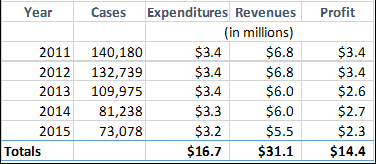 Municipal Court profit Municipal Court profit The recommendations from the work group would expand the city's powers to force debtors to pay delinquent citations, but makes no recommendations to protect the rights of defendants. The city already funds police to write tickets, attorneys to prosecute Municipal Court cases, and a collection agency to collect overdue citations. Defendants, however, are on their own and are not provided lawyers, even when they are facing incarceration. Municipal Court judges, who are supposed to hold indigency hearings to determine a defendant's ability to pay fines, often do not, court observations and audio of proceedings show. There is evidence that Municipal Court enforcement falls heaviest on those in the poorest city neighborhoods, where police presence -- and subsequent ticket writing -- is at higher levels. One of the work group's recommendations seems to be self-defeating. The group is recommending the city attorney's office explore the possibility of requiring payment of all past-due citations before an individual's vehicle is released from the city tow lot. That would, of course, make it much more difficult for the defendant to get to or look for the job needed to pay the fine. Update: Ald. Terry Witkowski told the Common Council's Judiciary and Legislation Committee Monday afternoon this recommendation was intended only to apply to parking citations. The group also is recommending the city explore "using wage attachments to collect delinquent debt" and that it begin a "friendly debt-collection program." The work group's final report is to be considered Monday (Oct. 24) by the Common Council's Judiciary and Legislation Committee. The group wants the Common Council to adopt an ordinance to allow immobilizing of illegally-parked vehicles "as a potentially more effective method of attaining parking compliance than towing" and is recommending the city lobby the state for a law allowing vehicle immobilization -- "booting" -- to tow or boot any vehicle with three or more parking tickets. Currently, only illegally parked cars can be booted. Public shaming is on the agenda, too. The work group is recommending that the Police Department "conduct a media campaign and online publication of the top 100 most egregious offenders for outstanding debts and warrants," according to group's final report. The recommendations come in the wake of city actions that already show that officials are looking to Municipal Court to generate funds for the cash-strapped city. The Common Council last year adopted -- and Mayor Barrett signed -- a resolution favoring adoption of state law that would allow the city to use a Municipal Court surcharge to pay for police body cameras. The measure's backers made clear the move was purely monetary and had nothing really to do with city ordinance violations. And the proposed Common Council's Public Safety Action Plan, which has come under fire from a variety of community groups and residents, says the city could pay for some of its recommendations by writing 30,000 more tickets per year to people who call 911 for non-emergencies or non-existent situations. That could raise about $1.5 million, assuming all those cited pay their fines, according to the plan. In reality, the city would likely have to write 50,000 or 60,000 additional tickets to raise $1.5 million in fines because many people do not or cannot pay their fines. City budget figures show that Municipal Court caseloads and revenue are down, but revenue is dropping at a much slower rate. The number of Municipal Court cases dropped 48% from 2011 through 2015, but revenue dropped just 20%. In the five-year period from 2011 through 2015, Municipal Court realized $31.1 million in revenue, mostly through forfeitures, while costing $16.7 million to operate, for a "profit" of $14.4 million. Its reasoning is absurd, but enough to allow Milwaukee Municipal Court to deny our open records request for audio tapes of its proceedings. We're not giving up, though. Accountability matters. Read the WJI press release here.
|
Donate
Help WJI advocate for justice in Wisconsin
|
Copyright © 2024 Wisconsin Justice Initiative Inc.
The Wisconsin Justice Initiative Inc. does not endorse candidates for political office. The Wisconsin Justice Initiative Inc. is a 501(c)3 organization.
The Wisconsin Justice Initiative Inc. does not endorse candidates for political office. The Wisconsin Justice Initiative Inc. is a 501(c)3 organization.

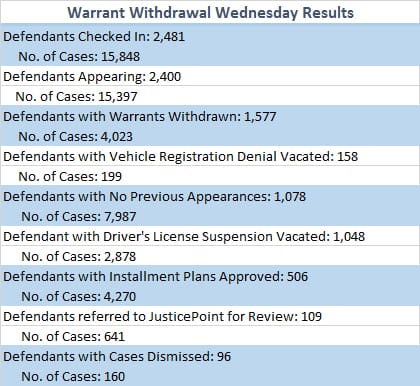
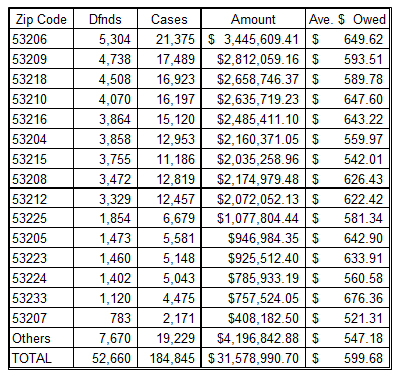
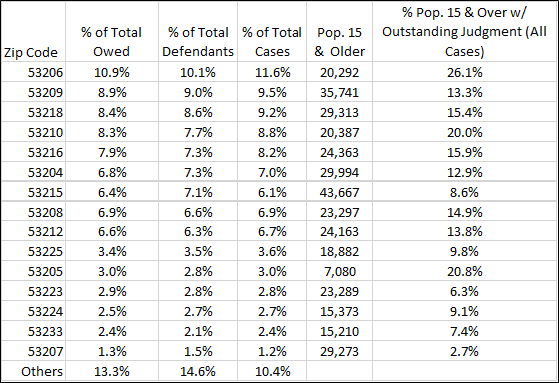
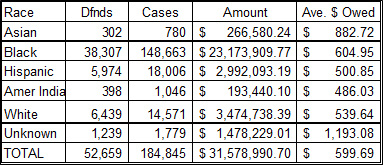





 RSS Feed
RSS Feed